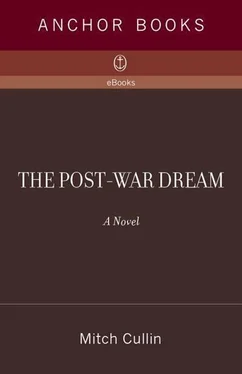At some point following his military discharge, Hollis had begun hearing about the troubles of ex-cavalrymen, various accounts regarding fellow soldiers whose behavior had turned erratic. decorated hero jumps in front of train, one newspaper article stated; other articles related stories of veterans who had thrown bedroom furniture from apartment windows, wandered naked around a busy town square while weeping aloud, attacked their own family members for reasons as minor as letting the teapot whistle for too long or forgetting to set out a butter knife when breakfast was served. His own mental state, however, hadn't really concerned him at first. His nerves, he had convinced himself, weren't shot, nor was he wracked by sleeplessness or plagued with flashbacks of the things he had experienced during battle. In truth, he had to drink just to fall asleep — and drink he did, the rounds commencing by the afternoon and continuing well past midnight, where he soon became a familiar face in all but two of the seven beer taverns which catered to his hometown of Critchfield, Minnesota.
For more than a month Hollis had stayed drunk, doing so once he had been officially welcomed back, paraded down Ripley Avenue in a chariot-red convertible led by the town's sole fire engine, smiling at those lining the sidewalks to greet him with enthusiastic waves (people who had given him little attention just months earlier, faces he had seen throughout his childhood but who had never really spoken to him). “Local hero Hollis,” he was called for a while, and with such an honorific title attached to his name, the twenty-year-old had an endless quantity of free liquor placed before him. Even a local tavern owner had told him, “Any fella that's done the tough job for this country won't be paying for his drinks here, at least until the war is finished with. It's on us, son. Drink up, you've earned it.”
And so Hollis had begun swallowing his fill — starting off the days with four or five Schell beers, concluding the nights with a combination of gin and a pinch of DDT commonly known as a Mickey Slim — until his legs could barely guide him a few blocks to the two-story Craftsman-style house he shared with his mother, Eden, and stepfather, Rich. Sometimes he passed out on the lawn or across the steps of the front porch, only to be helped inside by his increasingly wary mother. But usually he managed on his own, limping past the doorway, dragging himself up the stairs and into the musty-smelling bedroom which had always been his sanctuary; collapsing upon the twin mattress while still dressed (facedown, a shoe touching the floor in order to keep the room from spinning), he fell asleep beside a wall decorated with the triangular banners of his high-school football team, snoring as sunshine brightened the curtains and the smoky aroma of bacon frying wafted upstairs.
This debilitating ritual might have continued much longer had there not been the singular visitation of his immovable counterpart; for one morning after a particularly reckless night of breakneck drinking, Hollis had raised his throbbing head from the pillow and, blinking awake amid the subdued natural light of his room, beheld his duplicate standing at the foot of the bed. With eyes bloodshot and difficult to focus, it took a moment for him to comprehend what he was seeing, and seconds passed in a befuddled silence. Then like someone surfacing from the coldest of waters, his lips parted with an inaudible gasp just as his pupils dilated. He inhaled, breathing a sharp, pervasive scent resembling sulfur. As if the odor acted as a kind of smelling salt, he shuddered and, rising up on his elbows, began to fully grasp the uncanniness of the situation.
“What is this?” Hollis had uttered, except no reply was forthcoming. But hearing his mother talking downstairs — her high-pitched voice resonating while she spoke on the telephone — was enough to convince him that he wasn't dreaming. “This a joke?” he mumbled, addressing his double with trepidation. As his confusion transformed into fear, there was an increasingly quavering aura to the apparition: while seemingly stock-still, it began conveying a sort of elusive but persistent motion, not unlike the spinning blades of a fan. Nevertheless, it had a manufactured, artificial bearing, like a mannequin posed within a window display. The arms hung rigidly at its sides, and, mirroring Hollis in almost every way, it wore the same faded blue jeans, tan leisure shoes with rubber soles, bright blue Windbreaker, white T-shirt; the two exceptions being that, for whatever reasons, no silver-plated wristwatch was worn and its facial hair was thicker than the day's worth of stubble on Hollis's boyish face.
Before the shock had completely sunk in, the doppelganger went away, vanishing at the moment Hollis blinked his eyes. Still, the unpleasant smell lingered for a while, and sitting breathless on his bed, glancing from one end of the room to the other with his heart racing, he worried that his screws were coming loose. The nonstop carousing, he was sure, had finally taken its toll. Presuming such errant behavior was the main cause for the hallucination, he vowed to himself to cut back on his drinking (no more Mickey Slims, just the occasional beer), to spend more evenings at home (helping clear the dinner table and doing dishes, enjoying programs on the Zenith tube radio upon finishing the nightly chores), and, most important, to seek at least a modicum of guidance from the Lord (Wednesday and Sunday services would be heeded, the Holy Bible would be kept by his bedside but rarely, if ever, studied); and he promptly set about doing these things without any great struggle, easing the mind of his worried mother and pleasing her with how effortlessly he had righted himself.
But what had once been considered an illusory by-product of too much alcohol soon became a recurring enigma, troubling Hollis during his comparatively sober periods. In the months after his return from Korea, not a week passed when he didn't briefly spot his double — facing him at the opposite end of a grocery-store aisle, on a street corner, at the foot of his bed again — always accompanied by that acidic, distinctive odor. Each evanescent meeting brought lessening degrees of surprise, even as Hollis had repeatedly asserted underneath his breath, “Leave me alone. You get the heck out of here.”
“I'm sorry, what was that, dear?” Eden sometimes asked him. “What'd you say?”
“Nothing,” he replied, glaring toward a doorway, or down the hallway, or across the living room. “Nothing,” he said, while also thinking: Go on, you don't scare me anymore.
From December of one year to February of the next, the same apparition plagued him, the same face and stance — although his twin's hair had grown progressively bushy and wild, its bearded face ruddy and unwashed, the clothing wrinkled and soiled in places; with Hollis's fastidious attention to personal hygiene and general tidiness, the similarities were becoming less obvious. Max was what he finally christened the thing; Max, he called it, because the name sounded benign to him — because he had stopped recognizing the mirror image of himself whenever encountering it. As the physical condition of Max declined further, so, too, did the regularity of its unwelcome appearances. By the spring of ‘51, once he started working on a farm in West Texas, the visitations were few and far between (about every other month, observed from greater distances); and later on, during the decades he had spent living in Southern California, it was recognized only a handful of times — usually as Hollis drove San Gabriel Valley boulevards, perceived momentarily along sidewalks as a run-down, hunched form — leaving him with the distinct impression of having glimpsed a childhood acquaintance who no longer had any significant role in his life.
Читать дальше










![Theresa Cheung - The Dream Dictionary from A to Z [Revised edition] - The Ultimate A–Z to Interpret the Secrets of Your Dreams](/books/692092/theresa-cheung-the-dream-dictionary-from-a-to-z-r-thumb.webp)

